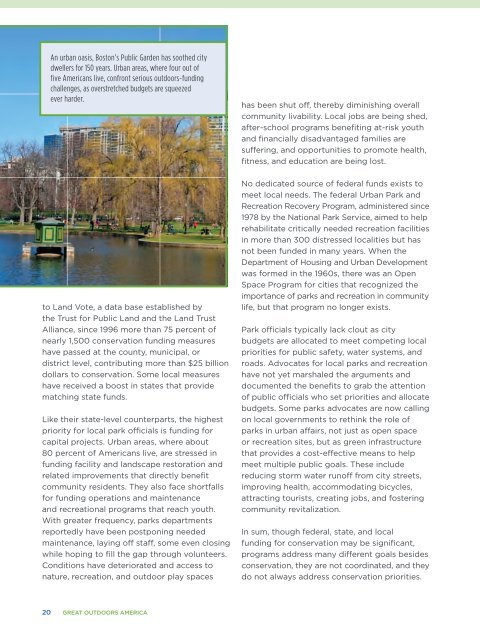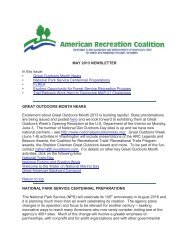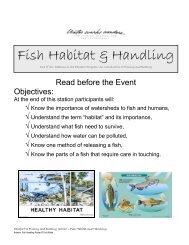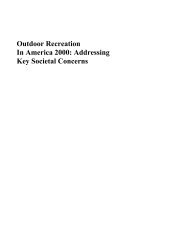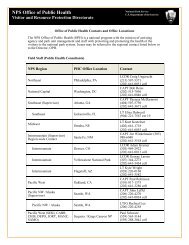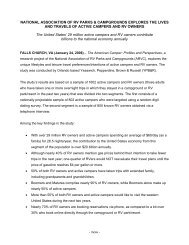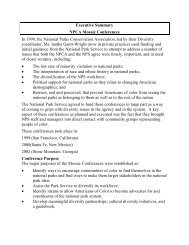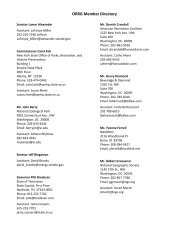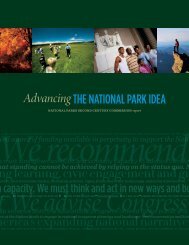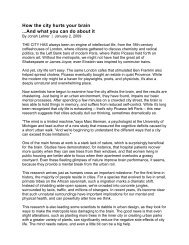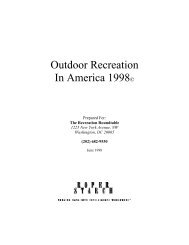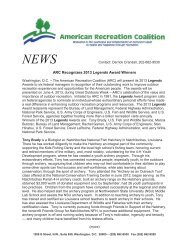Outdoor Resources Review Group Report - American Recreation ...
Outdoor Resources Review Group Report - American Recreation ...
Outdoor Resources Review Group Report - American Recreation ...
Create successful ePaper yourself
Turn your PDF publications into a flip-book with our unique Google optimized e-Paper software.
An urban oasis, Boston’s Public Garden has soothed city<br />
dwellers for 150 years. Urban areas, where four out of<br />
five <strong>American</strong>s live, confront serious outdoors-funding<br />
challenges, as overstretched budgets are squeezed<br />
ever harder.<br />
to Land Vote, a data base established by<br />
the Trust for Public Land and the Land Trust<br />
Alliance, since 1996 more than 75 percent of<br />
nearly 1,500 conservation funding measures<br />
have passed at the county, municipal, or<br />
district level, contributing more than $25 billion<br />
dollars to conservation. Some local measures<br />
have received a boost in states that provide<br />
matching state funds.<br />
Like their state-level counterparts, the highest<br />
priority for local park officials is funding for<br />
capital projects. Urban areas, where about<br />
80 percent of <strong>American</strong>s live, are stressed in<br />
funding facility and landscape restoration and<br />
related improvements that directly benefit<br />
community residents. They also face shortfalls<br />
for funding operations and maintenance<br />
and recreational programs that reach youth.<br />
With greater frequency, parks departments<br />
reportedly have been postponing needed<br />
maintenance, laying off staff, some even closing<br />
while hoping to fill the gap through volunteers.<br />
Conditions have deteriorated and access to<br />
nature, recreation, and outdoor play spaces<br />
20 GREAT OUTDOORS AMERICA<br />
has been shut off, thereby diminishing overall<br />
community livability. Local jobs are being shed,<br />
after-school programs benefiting at-risk youth<br />
and financially disadvantaged families are<br />
suffering, and opportunities to promote health,<br />
fitness, and education are being lost.<br />
No dedicated source of federal funds exists to<br />
meet local needs. The federal Urban Park and<br />
<strong>Recreation</strong> Recovery Program, administered since<br />
1978 by the National Park Service, aimed to help<br />
rehabilitate critically needed recreation facilities<br />
in more than 300 distressed localities but has<br />
not been funded in many years. When the<br />
Department of Housing and Urban Development<br />
was formed in the 1960s, there was an Open<br />
Space Program for cities that recognized the<br />
importance of parks and recreation in community<br />
life, but that program no longer exists.<br />
Park officials typically lack clout as city<br />
budgets are allocated to meet competing local<br />
priorities for public safety, water systems, and<br />
roads. Advocates for local parks and recreation<br />
have not yet marshaled the arguments and<br />
documented the benefits to grab the attention<br />
of public officials who set priorities and allocate<br />
budgets. Some parks advocates are now calling<br />
on local governments to rethink the role of<br />
parks in urban affairs, not just as open space<br />
or recreation sites, but as green infrastructure<br />
that provides a cost-effective means to help<br />
meet multiple public goals. These include<br />
reducing storm water runoff from city streets,<br />
improving health, accommodating bicycles,<br />
attracting tourists, creating jobs, and fostering<br />
community revitalization.<br />
In sum, though federal, state, and local<br />
funding for conservation may be significant,<br />
programs address many different goals besides<br />
conservation, they are not coordinated, and they<br />
do not always address conservation priorities.


